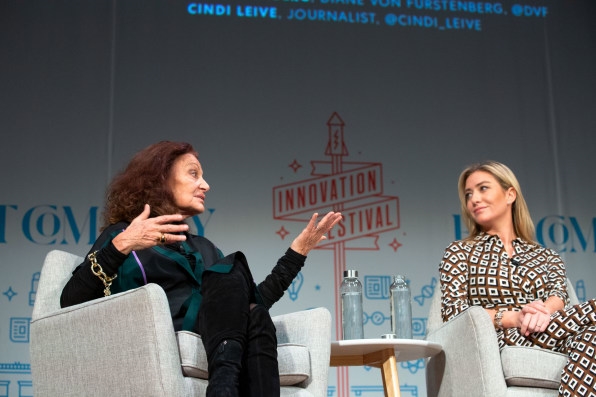Diane von Furstenberg: I was an icon—now, I’m the oracle
In 1972, Diane von Furstenberg started her namesake fashion line that would launch a thousand wrap dresses. More than 40 years later, she continues to be a champion for women, empowering them with fashion as well as mentorship and financial support. “People ask, ‘What is a DVF woman? What is it that I try to give women?’” she said during a panel at the Fast Company Innovation Festival on Thursday. “It’s really for them to feel in charge.”
That’s the very feeling von Furstenberg sought to bottle for herself when she started her company. “I wanted to have a man’s life in a woman’s body,” she said. “[Being] independent was my goal.” But while she was at the helm of–and synonymous with–her brand for years, it was only in this decade that she really saw herself as a designer. “I didn’t study design,” she said. “I thought of myself as a woman who made clothes for other women.”
Von Furstenberg was joined on stage by another woman in charge: Whitney Wolfe Herd, founder and CEO of Bumble, the women-first social networking app. (Bumble started as a dating app that required female users make the first move but has since expanded to social and professional networking). Both women talked about the challenges they face as women in leadership positions.

[Photo: Daisy Korpics for Fast Company]
“There’s been this insecurity that I’ve had the last few years–that I have to overcompensate and be overly nice to get respect and get my point across,” Wolfe Herd said. It’s only recently that she has “let go of trying to be nice” and stopped worrying about being liked. “That’s not being kind,” she continued. “That’s being phony. I think there’s this huge difference between being nice and being kind. And being kind is sometimes not so nice.”
Von Furstenberg added that being nice feels passive; being kind, on the other hand, is more “active.”
In the age of #MeToo, as moderator and journalist Cindi Leive pointed out, female leadership seems especially urgent. “What terrifies me is I’ve heard a lot of men say, ‘I won’t be in a room alone with a woman. I’m going to be accused,’” Wolfe Herd said. “And I’m like yes, if you’re a predator, you’ve got to be worried!”
But as the #MeToo reckoning has laid bare, von Furstenberg added, shifting that mindset also involves raising boys differently. “I have spent my life empowering women,” she said. “But now I’m beginning to say, you know what? We should also worry about the little boys.”
In the workplace, men need to see–and work with–more women in power. “If you think about what we’re doing at Bumble, by encouraging women to make the first move, we’re not trying to make it easier for guys or allowing them to be lazy,” Wolfe Herd said. “What we’re trying to show is: What happens when you let women lead?”
She points out that, for many men, the first example of a female “boss” is his own mother. “We need to empower women starting early to be confident, to be secure, to know their worth,” she says. “It’s about reverse engineering these archaic norms.”
One such norm von Furstenberg pushes back on? Ageism, especially as it affects women. She proudly shared her age–71–and said she has never understood why people are too embarrassed to do the same. (“Aging means you have lived!”)
“I was an icon,” von Furstenberg said. “Now, in my third act, I am the oracle. I’m an old woman. I have a lot of experience. There’s nothing I haven’t done. So come to me for advice.”
(14)

